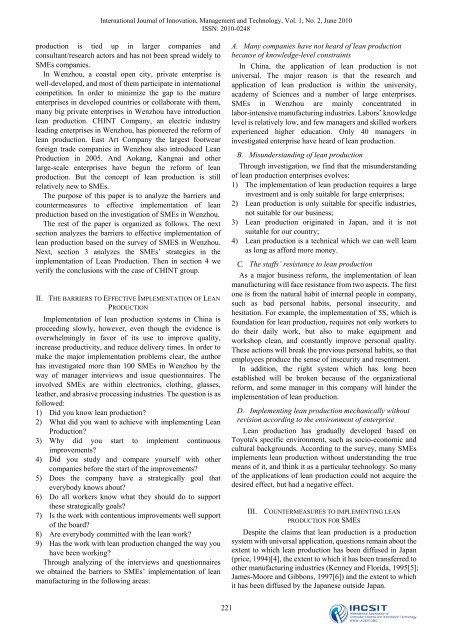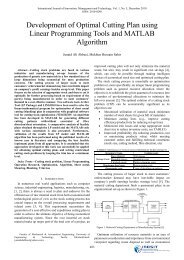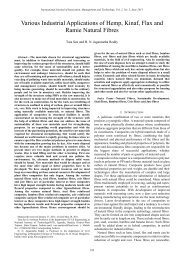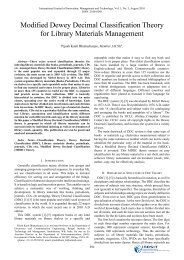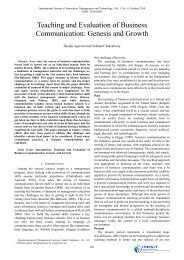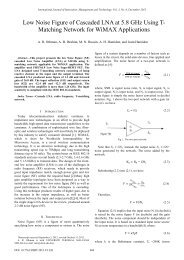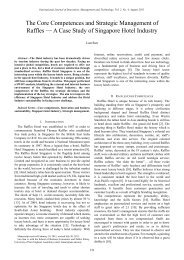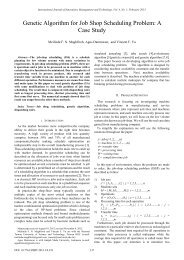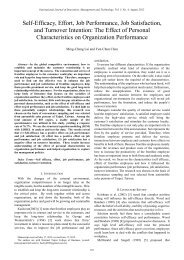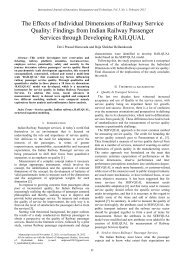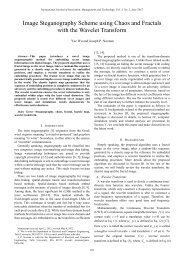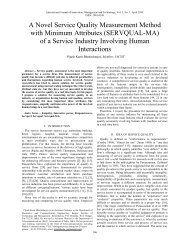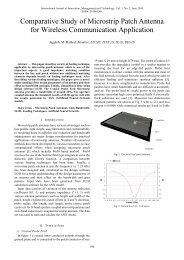International Journal <strong>of</strong> Innovation, Management <strong>and</strong> Technology, Vol. 1, No. 2, June 2010ISSN: 2010-0248production is tied up in larger companies <strong>and</strong>consultant/research ac<strong>to</strong>rs <strong>and</strong> has not been spread widely <strong>to</strong>SMEs companies.In Wenzhou, a coastal open city, private enterprise iswell-developed, <strong>and</strong> most <strong>of</strong> them participate in internationalcompetition. In order <strong>to</strong> minimize the gap <strong>to</strong> the matureenterprises in developed countries or collaborate with them,many big private enterprises in Wenzhou have introductionlean production. CHINT Company, an electric industryleading enterprises in Wenzhou, has pioneered the reform <strong>of</strong>lean production. East Art Company the largest footwearforeign trade companies in Wenzhou also introduced <strong>Lean</strong><strong>Production</strong> in 2005. And Aokang, Kangnai <strong>and</strong> otherlarge-scale enterprises have begun the reform <strong>of</strong> leanproduction. But the concept <strong>of</strong> lean production is stillrelatively new <strong>to</strong> SMEs.<strong>The</strong> purpose <strong>of</strong> this paper is <strong>to</strong> analyze the barriers <strong>and</strong>countermeasures <strong>to</strong> effective implementation <strong>of</strong> leanproduction based on the investigation <strong>of</strong> SMEs in Wenzhou.<strong>The</strong> rest <strong>of</strong> the paper is organized as follows. <strong>The</strong> nextsection analyzes the barriers <strong>to</strong> effective implementation <strong>of</strong>lean production based on the survey <strong>of</strong> SMES in Wenzhou.Next, section 3 analyzes the SMEs’ strategies in theimplementation <strong>of</strong> <strong>Lean</strong> <strong>Production</strong>. <strong>The</strong>n in section 4 weverify the conclusions with the case <strong>of</strong> CHINT group.II. THE BARRIERS TO EFFECTIVE IMPLEMENTATION OF LEANPRODUCTION<strong>Implementation</strong> <strong>of</strong> lean production systems in China isproceeding slowly, however, even though the evidence isoverwhelmingly in favor <strong>of</strong> its use <strong>to</strong> improve quality,increase productivity, <strong>and</strong> reduce delivery times. In order <strong>to</strong>make the major implementation problems clear, the authorhas investigated more than 100 SMEs in Wenzhou by theway <strong>of</strong> manager interviews <strong>and</strong> issue questionnaires. <strong>The</strong>involved SMEs are within electronics, clothing, glasses,leather, <strong>and</strong> abrasive processing industries. <strong>The</strong> question is asfollowed:1) Did you know lean production?2) What did you want <strong>to</strong> achieve with implementing <strong>Lean</strong><strong>Production</strong>?3) Why did you start <strong>to</strong> implement continuousimprovements?4) Did you study <strong>and</strong> compare yourself with othercompanies before the start <strong>of</strong> the improvements?5) Does the company have a strategically goal thateverybody knows about?6) Do all workers know what they should do <strong>to</strong> supportthese strategically goals?7) Is the work with contentious improvements well suppor<strong>to</strong>f the board?8) Are everybody committed with the lean work?9) Has the work with lean production changed the way youhave been working?Through analyzing <strong>of</strong> the interviews <strong>and</strong> questionnaireswe obtained the barriers <strong>to</strong> SMEs’ implementation <strong>of</strong> leanmanufacturing in the following areas:A. Many companies have not heard <strong>of</strong> lean productionbecause <strong>of</strong> knowledge-level constraintsIn China, the application <strong>of</strong> lean production is notuniversal. <strong>The</strong> major reason is that the research <strong>and</strong>application <strong>of</strong> lean production is within the university,academy <strong>of</strong> Sciences <strong>and</strong> a number <strong>of</strong> large enterprises.SMEs in Wenzhou are mainly concentrated inlabor-intensive manufacturing industries. Labors’ knowledgelevel is relatively low, <strong>and</strong> few managers <strong>and</strong> skilled workersexperienced higher education. Only 40 managers ininvestigated enterprise have heard <strong>of</strong> lean production.B. Misunderst<strong>and</strong>ing <strong>of</strong> lean productionThrough investigation, we find that the misunderst<strong>and</strong>ing<strong>of</strong> lean production enterprises evolves:1) <strong>The</strong> implementation <strong>of</strong> lean production requires a largeinvestment <strong>and</strong> is only suitable for large enterprises;2) <strong>Lean</strong> production is only suitable for specific industries,not suitable for our business;3) <strong>Lean</strong> production originated in Japan, <strong>and</strong> it is notsuitable for our country;4) <strong>Lean</strong> production is a technical which we can well learnas long as afford more money.C. <strong>The</strong> staffs’ resistance <strong>to</strong> lean productionAs a major business reform, the implementation <strong>of</strong> leanmanufacturing will face resistance from two aspects. <strong>The</strong> firs<strong>to</strong>ne is from the natural habit <strong>of</strong> internal people in company,such as bad personal habits, personal insecurity, <strong>and</strong>hesitation. For example, the implementation <strong>of</strong> 5S, which isfoundation for lean production, requires not only workers <strong>to</strong>do their daily work, but also <strong>to</strong> make equipment <strong>and</strong>workshop clean, <strong>and</strong> constantly improve personal quality.<strong>The</strong>se actions will break the previous personal habits, so thatemployees produce the sense <strong>of</strong> insecurity <strong>and</strong> resentment.In addition, the right system which has long beenestablished will be broken because <strong>of</strong> the organizationalreform, <strong>and</strong> some manager in this company will hinder theimplementation <strong>of</strong> lean production.D. Implementing lean production mechanically withoutrevision according <strong>to</strong> the environment <strong>of</strong> enterprise<strong>Lean</strong> production has gradually developed based onToyota's specific environment, such as socio-economic <strong>and</strong>cultural backgrounds. According <strong>to</strong> the survey, many SMEsimplements lean production without underst<strong>and</strong>ing the truemeans <strong>of</strong> it, <strong>and</strong> think it as a particular technology. So many<strong>of</strong> the applications <strong>of</strong> lean production could not acquire thedesired effect, but had a negative effect.III. COUNTERMEASURES TO IMPLEMENTING LEANPRODUCTION FOR SMESDespite the claims that lean production is a productionsystem with universal application, questions remain about theextent <strong>to</strong> which lean production has been diffused in Japan(price, 1994)[4], the extent <strong>to</strong> which it has been transferred <strong>to</strong>other manufacturing industries (Kenney <strong>and</strong> Florida, 1995[5];James-Moore <strong>and</strong> Gibbons, 1997[6]) <strong>and</strong> the extent <strong>to</strong> whichit has been diffused by the Japanese outside Japan.221
International Journal <strong>of</strong> Innovation, Management <strong>and</strong> Technology, Vol. 1, No. 2, June 2010ISSN: 2010-0248<strong>The</strong> picture <strong>of</strong> uneven diffusion across nations <strong>and</strong>industries <strong>and</strong> the evidence for the partial diffusion <strong>of</strong> leanproduction within firms <strong>and</strong> plants have led some scholars <strong>to</strong>dispute the real contents <strong>of</strong> the lean concept(Richard,2002)[7], questioning whether it is a coherent productionconcept (Bartezzaghi, 1999)[8].Many scholars have analyzed the reasons <strong>of</strong> successes<strong>and</strong> failures <strong>of</strong> implementation <strong>of</strong> lean manufacturing in ourcountry, many <strong>of</strong> them have pointed out that the result <strong>of</strong>implementation <strong>of</strong> lean manufacturing in our country is notsatisfac<strong>to</strong>ry mainly due <strong>to</strong> that China <strong>and</strong> Japan's nationalculture <strong>and</strong> corporate culture is very different. But we believethat national or corporate culture differences are not decisivefac<strong>to</strong>rs. As James P. Womack (2005)[9], the master <strong>of</strong>management, said that lean production can be applied <strong>to</strong> any<strong>of</strong> the different countries, regions, manufacturing plants <strong>and</strong>cultures.Since there is no direct relationship between the qualities<strong>of</strong> lean production’s implementation <strong>and</strong> culture, then what isthe key fac<strong>to</strong>r affecting the effective implementation <strong>of</strong> leanproduction. This paper believes that the problem lies in thatenterprises’ managers in China do not know the real meaning<strong>of</strong> lean production. Many enterprises <strong>of</strong>ten show <strong>of</strong>f theirmeans <strong>of</strong> production, such as the U-shaped production unit,Kaizen, Kanban, 5S, etc. It seems that lean production will beachieved as long as the application <strong>of</strong> these means <strong>and</strong> <strong>to</strong>olsin their enterprises. James P. Womack has given aconnotation <strong>of</strong> lean production in the ‘<strong>Lean</strong> thinking’ that itmeans continuing methodical march from success <strong>to</strong> success<strong>and</strong> doing it the hard way by creating real <strong>and</strong> trulysustainable value for their cus<strong>to</strong>mers, their employees, <strong>and</strong>their owners.It is clear that the implementation <strong>of</strong> lean production isnot only <strong>to</strong> introduce management methods <strong>and</strong> managementtechniques, but also <strong>to</strong> introduce the completely differentmanagement ideas <strong>and</strong> systems. <strong>The</strong>refore, we believe that inorder <strong>to</strong> carry out a thorough reform, that is, the effectiveimplementation <strong>of</strong> lean production, enterprises would beprovided from the following four organizational point <strong>of</strong>view ,<strong>and</strong> they are the attention <strong>and</strong> involvement <strong>of</strong> seniormanagers, good communication platform, learningorganization <strong>and</strong> the establishment <strong>of</strong> performanceevaluation system.A. <strong>The</strong> attention <strong>and</strong> involvement <strong>of</strong> senior manager<strong>The</strong> implementation <strong>of</strong> lean production, as a majorbusiness change, is bound <strong>to</strong> face resistance from the twoaspects. On one h<strong>and</strong>, it is the resistance from the individualsin enterprises, such as poor personal habits, personalinsecurity, as well as thinking <strong>of</strong> some people. On the otherh<strong>and</strong>, it is the resistance from the organization. Teamworking method, staff participation, pull-type productionmethods which lean production requires inverse <strong>to</strong> theoriginal terms <strong>of</strong> system-<strong>to</strong>-business, management thinking<strong>and</strong> management methods.In order <strong>to</strong> eliminate such resistances, senior managersmust have a high-level awareness <strong>of</strong> changing inmanagement, <strong>and</strong> firmly push forward the reform. <strong>The</strong>refore,it is necessary <strong>to</strong> establish a leader team whose members havereputation, decision-making power, information, expertise<strong>and</strong> good interpersonal relationships <strong>to</strong> ensure a smoothchange. <strong>The</strong> enterprises failed are <strong>of</strong>ten underestimated bytheir resistances <strong>to</strong> reform.222According the survey <strong>of</strong> Henry Johnson, an Americanmanagement scientist, about 43% <strong>of</strong> respondents believe thatthe establishment <strong>of</strong> a strong leadership team is an importantreason <strong>of</strong> the success <strong>of</strong> reform in enterprise [10].B. Good communication platformGood communication platform involves “networks” <strong>and</strong>“internal” platform.Why has lean production not been spread widely <strong>to</strong> SMEscompanies? One explanation is that, compared <strong>to</strong> largercompanies, SMEs <strong>of</strong>ten lacks <strong>of</strong> resources <strong>and</strong> competence <strong>to</strong>develop <strong>and</strong> improve their production systems [11]. Anotherexplanation is the “knowledge paradox” where thecompanies lack information on <strong>Lean</strong> <strong>Production</strong> <strong>and</strong> otherimprovement methods. One way <strong>to</strong> meet this has been <strong>to</strong> startnetworks <strong>to</strong>gether with other companies in order <strong>to</strong> learn <strong>and</strong>practice lean principles <strong>and</strong> methods. Bititci et al., (2004)stress that in collaborative networks, it is important for theparticipants <strong>to</strong> see value enhancement, internal or external(wealth <strong>and</strong>/or satisfaction). This creates a need for some sor<strong>to</strong>f performance measurement in the network [12].On the other h<strong>and</strong>, implementing lean production needs aeffective internal communication platform. <strong>Lean</strong> productionrequires that all staffs participate in the enterprise reform, allstaffs’ thinking <strong>and</strong> action must be unified. But this is acontinuing long-term process.In this process, communication <strong>and</strong> exchange is the mostimportant <strong>and</strong> perhaps the only way. And training is the bestway <strong>of</strong> communication.<strong>The</strong> implementation <strong>of</strong> lean production requires a lot <strong>of</strong>training including the training <strong>of</strong> advanced managementideas (such as lean production, full self-management) <strong>and</strong>training advanced management <strong>to</strong>ols (such as 5S, Kanban,rationalization proposals, etc.).Staffs that have uneven level <strong>of</strong> knowledge will have thesame language in day-<strong>to</strong>-day learning <strong>and</strong> communication.C. Learning organizationAt home <strong>and</strong> abroad many manager realize that leanproduction is a set <strong>of</strong> simple management <strong>to</strong>ols <strong>and</strong> systems,<strong>and</strong> in fact is a complex project that Toyota has foundedthrough long-term organizational learning <strong>and</strong> continuousimprovement.<strong>The</strong>re is no way that a big change as implementing leanproduction could be done over a night. <strong>The</strong> implementationhas <strong>to</strong> be carefully planned, the underst<strong>and</strong>ing from the staffshas <strong>to</strong> grow <strong>and</strong> the <strong>to</strong>p manager has <strong>to</strong> carry the plan quitehard without losing the employees trust or motivation.In Toyota production system, all staffs are good atlearning <strong>and</strong> active thinking in the process <strong>of</strong> continuousimprovement, which are much more meaningful thanlearning itself. Further improvements can be achieved whenstaffs have the ability <strong>to</strong> think effectively in the process <strong>of</strong>improvement. And good at learning is the essential feature <strong>of</strong>learning organization.Learning organization emphasizes life-long learning,whole process <strong>of</strong> learning, <strong>to</strong>tal learning <strong>and</strong> team learning.In a learning organization, everyone must be involved inidentifying <strong>and</strong> solving problems, so that organizations cancontinually improve <strong>and</strong> enhance its capacity.<strong>The</strong>refore, in order <strong>to</strong> learn from lean production,learning-oriented organizations must be set up in Chineseenterprises; <strong>and</strong> improving the organization's learning


